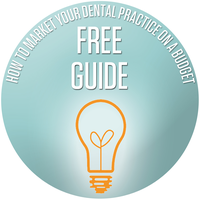
Having difficult conversations with patients is part of your job. You may have to discuss the need for a treatment like a root canal, crowns, or implants. There’s anxiety and cost associated with them. Now, telling a patient that they need an oral cancer screening is a whole different type of conversation.
Just the word ‘cancer’ strikes fear in most people. Outcomes are much less certain. Dentists can't use amalgam or porcelain to fix a tongue or jaw that's cancerous. They also leave their patients with a great deal of anxiety because suspecting cancer based on a visual exam is not the same as confirming it with a biopsy or other reliable test.
You will want to have a formal plan for breaking news of this sort to your patients. So, now we will take a closer look at the conditions and some strategies you can use to provide patients with the help they need. We also have a resource with Oral Cancer Awareness Tips that you can share with your patients.
Key Takeaways:
- Conversations about oral cancer screenings are challenging due to the fear associated with the word 'cancer.'
- A formal plan is essential for communicating potential cancer diagnoses to patients.
- Oral cancer is common, representing about 3% of annual cancer diagnoses in the U.S., with higher prevalence in men.
- Symptoms of oral cancer include neck swelling, cheek lumps, difficulty swallowing, and jaw or tongue movement issues.
- Dentists play a crucial role in early detection through visual exams and should reassure patients about non-cancerous lesions.
- Referrals to specialists are necessary for confirming oral cancer, and office staff can assist in appointment scheduling.
- Providing written materials helps patients process information about screenings and treatments.
- Support staff should be present during discussions to help manage patient emotions and provide reassurance.

Common Symptoms of Oral Cancer
Head and neck cancer is not often talked about. The most common forms are oral and oropharyngeal cancers. Oral cancer is relatively common, accounting for about 3% of all cancer diagnoses each year in the United States. It's more frequently seen in men than women, and the chances increase as we get older. For men, the lifetime risk of developing oral cavity and oropharyngeal cancer is about 1 in 59, while for women, it's about 1 in 139.
Just like with many other types of cancer, the signs and symptoms of oral cancer can differ from one person to another. Here are some of the common symptoms you might notice:
- Swelling in the neck
- A lump in the cheek
- Difficulty swallowing or chewing.
- Trouble moving the jaw or tongue.
- Loosening of the teeth
- Pain in the teeth or jaw
- Voice changes
Types of Oral Cancer
Oral cancers can be grouped by where they start, like the lip, jaw, cheek, or tongue, and the type of cells involved. Lymphoma, for instance, begins in lymphocytes, which are the cells that help fight infections. Since the tonsils and the base of the tongue have lymphoid tissue, cancer can appear there.
Squamous Cell Carcinoma is the most common type of mouth cancer and happens when these cells change and spread to nearby areas like lymph nodes or bones. Mucosal Melanoma, which affects the cells that give skin its color, can be sneaky and hard to spot, but it grows quickly.
Sarcoma starts in the bones, muscles, or other tissues. There's also salivary gland cancer, which occurs when abnormal cells grow in the salivary glands or their ducts.

Making Recommendations
Dentists are at the front line of detecting oral cancer in the early stages. After all, these cancers start out as abnormalities in the mouth. A visual exam is a good starting point. The patient should be counseled that many sores and lesions are not cancerous. If a routine screening uncovers a suspicious area, dentists should stress getting it tested without worrying the patient too much. They should also go over risk factors as patient history can sway the need to get a screening.

Provide Referrals
To confirm oral cancer, it's usually necessary to see a specialist, like an oral surgeon or oncologist, who can accurately diagnose and assess the condition. We want to make this process as smooth as possible, so it is helpful to provide a list of oral surgeons, complete with their contact details and specialties. Your dental team should also be there to lend a hand by helping schedule an appointment, and making sure all their medical records and referrals are sent over.

Offer Written Materials
As soon as the patient hears the word cancer, he or she will likely shut down and be unable to process more information. Patients should be given written materials which talk about the screening tests, and possible treatments. The National Institute of Dental and Craniofacial Research has some helpful resources about oral cancer and how to talk to your patients, which you can find here.

Include Support Staff
A hygienist or dental assistant should be present when the patient is told. This individual serves as a witness and can help calm upset patients. The key to discussing oral cancer screenings with patients is to impart their importance without causing unnecessary fear. It's a balance that takes finesse and a good deal of compassion.
Disclaimer: This article is provided for educational and informational purposes only and does not constitute providing medical advice or professional services.
Want to join the Solstice network? Connect with our dedicated provider relations team for more information about joining our network. You can call 1.877.760.2247 (Option 2) or email providerrelations@solsticebenefits.com.
Already in the Solstice network? Search to see if you're part of the Solstice dental PPO or HMO network. You can also go to https://www.mysolstice.net/ or call us at 1.877.760.2247 (Option 2).



